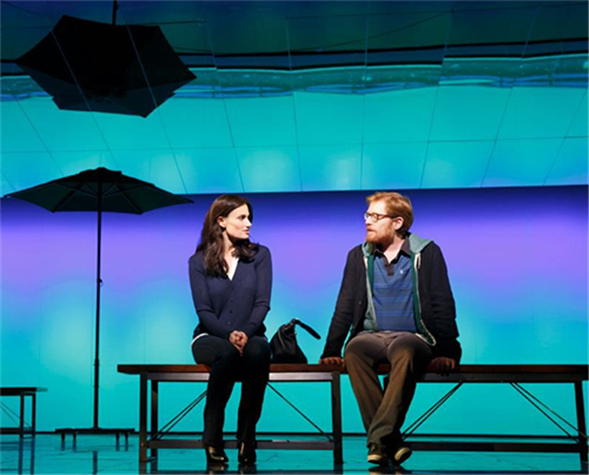Translate Page

Inside the development of the ambitious new musical
---
It all starts so simply. In the first scene of If/Then, recently-divorced Elizabeth (Idina Menzel) meets her friends Kate (LaChanze) and Lucas (Anthony Rapp) in the park, and they present her with a straightforward choice. Kate, who calls Elizabeth "Liz," thinks she should go with her to have some fun, and Lucas, who calls her "Beth," wants her to join him for some professional networking.
So which friend does she follow? In this unusual musical, which is now on Broadway at the Richard Rodgers Theatre, Elizabeth follows them both. The show interweaves two parallel plots that stem from that initial decision, allowing us to see how Liz's fate compares to Beth's.
But as direct as it is, that opening scene was incredibly challenging to craft.
Granted, the setting and structure of the opening haven't changed since the earliest readings: Elizabeth has always encountered Lucas and Kate in the park. "It was just the specifics of the moment---what exactly happened that led to the next and led to the next that kept getting refined and changed," says Rapp.
That was accomplished by making the lyrics (by Brian Yorkey) as clean and specific as possible. Director Michael Greif also focused on repetition in Kate's and Lucas's suggestions.
But unlike most shows, the creative team didn't have any reference material to guide their story. If/Then is a completely original musical, meaning it's not based on a book or movie or any other source. Greif; Yorkey, who also wrote the book; and composer Tom Kitt had to test scenario after scenario to see which one worked.
As Greif explains it, the challenge was "how to examine the events of those two lives in the traditional amount of time given to examine one life. A lot of thought has gone into honoring both lives and respecting both choices."
To that end, Greif calls the rehearsal process "wonderfully contradictory." Sometimes they would separate the stories out---linking up all the Beth scenes and following them through, then doing the same with the Liz storyline. "In that way it felt like rehearsing a usual play or musical in terms of one scene leading into another," Greif says. At other times, they would focus on the quick switches back and forth, like when Beth gets under the covers with one man and Liz pulls them back to reveal another.
For the actors, the dual rehearsal process was not that different from any other. "When you rehearse something, part of the process for me is you break it down and you make sure that everybody agrees on what the given circumstances are," Rapp says. "Like any play, there are all kinds of events that take place that aren't depicted on stage, and you have to fill in those blanks. A big part of it was to make sure that we all had a good sense of what the blanks were that we were filling in." He also had to be aware of which timeline he was in as Lucas interacts with both Liz and Beth, but his relationship with each is very different. He is romantically interested in Beth, for instance, but in the Liz plot he dates David (Jason Tam).
Each method of rehearsal provided its own benefits. "Some things become very clear and evident only when you separate one half out," Greif says. "If you stick with all the best scenes, you'll often find a throughline or a development that was getting lost or masked in the switching back and forth."
In rehearsing both narratives together, the team could find not only the differences, but also the echoes and similarities between them. "Sometimes what Beth is feeling will affect something that Liz does and vice versa," Greif says. "It's almost like there's a twinning going on, and there's an awareness of that other you in the world, which is very much written into the play both musically and lyrically."
Finally, through an out-of-town tryout at the National Theatre in Washington, D.C., the company got invaluable lessons on what was working for audiences. "When an audience is restless it's mostly because they're not able to follow step-by-step the events of a story," Greif says. "Sometimes they're merely bored, but I think more often than not they felt left out, so we were able to explore the places where they felt left out. The way in which the audience watches always tells you things."
---
Linda Buchwald tweets about theatre as @PataphysicalSci
Photo by Joan Marcus